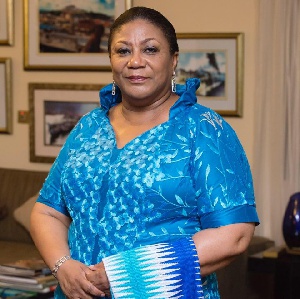The First Lady, Mrs Rebecca Akufo-Addo, has called for the economic empowerment of women and girls in Africa, especially mothers, to help keep their children in school.
She said income generated from such empowerment could help the girls, some of whom were mothers, to keep their children in school.
She said female children, who were usually denied education when the family could not afford the cost, would benefit immensely from economic empowerment.
Speaking at a side-event organised by the Organisation of African First Ladies for Development (OAFLAD) at the on-going United Nations General Assembly in New York, Mrs Akufo-Addo recommended community engagement as one of the tools that the other first ladies could use in getting more people to accept their interventions in the various communities.
The meeting, which was themed: “Renewing Commitment towards enhancing Gender Equality and Women’s Empowerment in Africa,” brought together first ladies, development partners and policymakers from across Africa.
She spoke on the topic: How to improve girls and women’s access to quality education in Africa”.
Citing the Rebecca Foundation, of which she is the Executive Director, as an example, Mrs Akufo-Addo said the Foundation, through the “Because I Want to Be’’ initiative, assigns girls who were unable to go back to school to mentors who provided them with income-generating skills.
Before the initiative was started, “we carried out research in our target communities to determine the local hindrances to the education of girls and the community’s role and recommendations for improving their education,” she said.
“We also held community durbars to dialogue on how communities can be involved in the project. The result was a high community turn-out at the various launches of the initiative, high endorsement of communities and high patronage by both in school and out of school girls.”
Mrs Akufo-Addo called on her colleagues to work at building partnerships as she was doing with the “Because I Want to Be” initiative.
“We built a multi-disciplinary collaboration with the UNFPA, various ministries and individuals”.
This, she said, ensured access to funding and technical support from partners as well as ensuring its sustainability and mainstreaming even after her term of office.
Mrs Fatima Naada-Bio, the First Lady of Sierra Leone, called on African countries to promote free education at all levels to ensure that boys and girls had equal access.
She said poverty led to the lack of education for millions of girls on the Continent and, therefore, with free education, that barrier could be removed.
Mrs Aissata Issoufou Mahamadou, Niger’s First Lady, called on all to encourage girls to go to school and stay on as long as possible.
Princess Mabel van Oranje, the Board Chair, Girls Not Brides, called on the first ladies to work at continually breaking all barriers that hindered girls’ education such as female genital mutilation and early marriages.
She urged the first ladies to work with communities to ensure that real change happened in the various communities.
Princess Oranje called on the first ladies to implore their husbands to keep their election campaign promises.
General News of Thursday, 26 September 2019
Source: ghananewsagency.org

















